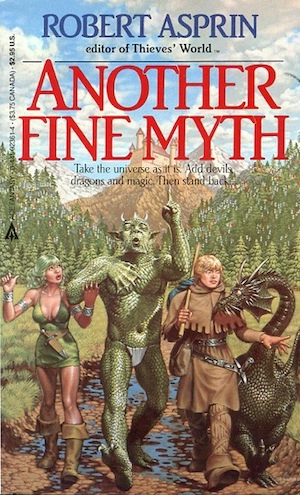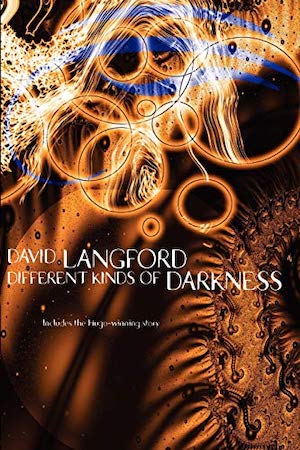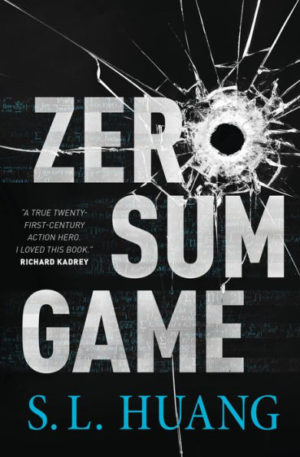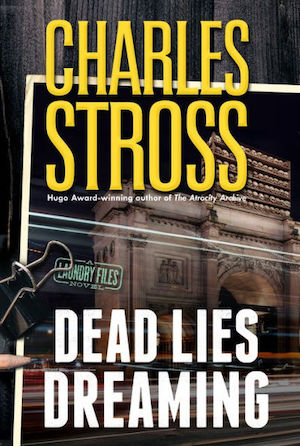Superhero fiction is rich in characters who won the superpower lottery. They are simultaneously invulnerable, able to fly, equipped with super-strength, super-speed, invulnerability, flight, shapeshifting, invisibility, intangibility, psychic powers, and the ability to create ice-cream out of nothing. It’s always useful to have at least one of those guys around and in fact the Legion of Super-Heroes (in an uncharacteristic moment of clarity) had a loophole in their “no duplicate powers” rule that allowed them to add as many Superboy-knockoffs as they could get.
However, do-anything lads or lasses (and their all-powerful wizard cousins over in fantasy) present the author with the problem of presenting these overpowered characters with challenges not immediately solved with little effort using their vast arsenal of abilities. In many ways, characters limited to one or two minor knacks are more fun from an author’s perspective, because weaker characters have to be ingenious (or at least lucky), rather than just bulldozing through their problems.
This makes for amusing reading, as the five works below will show.1
Skeeve from Another Fine Myth by Robert Asprin (1978)

Wizard Garkin has a youthful apprentice, Skeeve. Lucky Skeeve, given the chance to master the breadth and depth of magic! But magic study is a long and arduous work; it takes years of study. Too bad that an assassin’s bolt ended poor Garkin’s life before Skeeve had taken more than a few steps along to the road to magic mastery.
The assassin was working for a would-be evil overlord, who saw Garkin as an impediment to his schemes. With Garkin dead, it falls to Garkin’s old chum Aahz and Garkin’s apprentice Skeeve to confound the evil overlord. But…there are problems. Just before his death, Garkin played a practical joke on Aahz that stripped Aahz of his magic. Aahz therefore has a lot of knowledge, but no ability to put it into action. Skeeve, on the other hand, can work magic, but knows only two weak spells: levitation and minor pyrokinesis.
Can the pair save the world with just two minor spells?
Ken Vanrey from “Leaks” by David Langford (1991)

Ken Vanrey’s very special ability is just good enough to earn him a position with the UK’s Department of Paranormal Resources. However, the DPR’s standards are comprehensive but undemanding. Anyone with paranormal powers, no matter how ludicrous, will be swept up by the DPR. Ken’s ability definitely qualifies as absurd—he can, by an act of will, ensure that his beer glass remains full. But that’s a bona fide paranormal power, so…
Ken is sent off to investigate skullduggery at a nuclear plant. His intended role is “stalking horse”: he is to ostentatiously poke around to see if the player on the other side is foolish enough to reveal themselves by taking a shot at Ken. Limited and very specific short-range teleportation seems unlikely to be of use in atomic espionage… but Ken is a bright guy and even limited superpowers are still quite handy, if applied in an unexpected way.
Mumen Rider from One-Punch Man by ONE (2009 onwards)

In a world filled with destructive, voracious monsters, each determined to create a larger body count than the last, humanity’s only meaningful protection are the members of the Hero Association: enhanced cyborgs like Genos, telekinetic champions like Tornado, and of course the indestructible, super-strong, inexplicably obscure Caped Baldy. And then there’s Mumen Rider.
Mumen Rider is a reasonably fit man with no superpowers. He does not even have a driver’s license. He does, however, have a bicycle, a safety helmet, intimate knowledge of road regulations, and a desire to help his fellow humans that cannot be crushed by…being crushed, among other things. Despite frequent trips to the hospital (and the presumably lengthy bouts of physical rehabilitation that follow), good-natured Mumen Rider will never fail to respond to the largest monster with unflinching courage, determination, and what looks like a swell multi-terrain bike.
Cas Russell from Zero Sum Game (and others) by S. L. Huang (2014)

There are indeed people with abilities far beyond mortal ken. Not that this is widely known. In this setting, people outed as having superpowers are attacked, their minds scrambled. No costumed superheroes in this world.
Protagonist Cas Russell has an unusual superpower: she can do complex computations in the blink of an eye. Now, super-math may sound like a niche skill, more suited to filling out tax forms quickly than to fighting. Leave it to Cas to figure out how to use her superpower in unexpected ways. Undetectable ways.
Cas also has a corresponding lack to balance out her special ability—namely, a poor grasp of ethics and morals. Still, a mind-scrambling attack on her friend Anton is sufficient to send her hunting for the evildoer.
Evelyn Starkey from Dead Lies Dreaming by Charles Stross (2020)

The United Kingdom is firmly in the grasping extremities of the New Management (horrors from beyond space and time who have claimed Earth as their rightful territory).
Evelyn Starkey is a personal assistant to her creepy boss Rupert. She’s a very good PA, proficient at a number of mundane skills. However, she does have one seemingly unimpressive special ability: just enough telekinesis and thermokinesis to prepare and heat a quick pot of coffee.
Turns out that this is good for more than supplying her boss with a steady stream of caffeine. Her powers can boil a brain or just lobotomize it. Minor her powers may be, but brains are incredibly fragile.
***
No doubt you all have your own favourite examples of interesting characters with minor abilities. Comments are, as ever, below.
In the words of fanfiction author Musty181, prolific book reviewer and perennial Darwin Award nominee James Davis Nicoll “looks like a default mii with glasses.” His work has appeared in Publishers Weekly and Romantic Times as well as on his own websites, James Nicoll Reviews (where he is assisted by editor Karen Lofstrom and web person Adrienne L. Travis) and the 2021 and 2022 Aurora Award finalist Young People Read Old SFF (where he is assisted by web person Adrienne L. Travis). He is a four-time finalist for the Best Fan Writer Hugo Award, and is surprisingly flammable.
[1]A footnoted hat tip here to a Daredevil villain, the Owl, a malevolent financier who believed his ability to slowly glide short distances would suffice to make him one of New York’s premier supervillains. He’s been powered up since he appeared in Issue 3, but one has to admire the self-confidence that let the early Owl jump from “can glide from one side of the Hudson River to the other, given a sufficiently brisk wind blowing in the correct direction” to “clearly the equal of Doctor Octopus and the Kingpin.”











Minor Mage, by T Kingfisher / Ursula Vernon. Oliver only has 3 spells, and one of them is to control his allergy to armadillo dander, which matters since his familiar is an armadillo. Nevertheless, he sets out to bring the rain back to his village. Has Kingfisher’s usual mix of humor, sincerity, and creepiness.
Characters who have to use their brains are much more interesting than those who can simply blast away all opposition.
Let’s not forget Squirrel Girl, who bested Doctor Doom by going all Mississippi Squirrel Revival on him. Plus she’s the only person in the Marvel universe to have conclusively defeated Thanos.
The heroine in A WIZARD’S GUIDE TO DEFENSIVE BAKING by T. Kingfisher has one minor talent, the ability to work with bread and dough. Someone is trying to kill her because of her magic despite it only being a yummy skill. Her ingenuity at turning that ability into a workable protection is really funny.
Amy Hopkins’ A DROP OF DREAM is a contemporary fantasy about a minor talent who only makes healing potions who has a magical serial killer after her.
2: There is a subset of characters whose powers are so overpowering as to be effectively useless: Black Bolt, X-Bomb Betty…
There’s Tobas, from Lawrence Watt-Evans’ “With A Single Spell”, who indeed knows only one minor spell. He does make the most of it, though.
There’s a great web serial called Worm. In it a adolescent girl gets the power of controlling insects near her. She becomes a truly feared force in the world. It is a dark story, but still a very fine story. Well worth a look.
It can be found here https://parahumans.wordpress.com/2011/06/11/1-1/
“he can, by an act of will, ensure that his beer glass remains full”
Just don’t try that trick in Callahan’s Bar.
To be fair to the Owl, isn’t that technically more powers than the Kingpin has? Unless things have changed, IIRC the closest thing Fisk has is “stronger and tougher than he looks”, but still within nominal human range.
Of course Fisk also has the skills to organize large criminal conspiracies and keep white clothing clean that the Owl presumably lacks.
Larry Niven’s character Gil Hamilton, having lost an arm, discovers his latent telekinesis, which functionally approximates his former physical limb. It is rather weaker (I seem to recall a full cup of coffee was near the limit of what it could support) but has the advantage of being able to reach through surfaces to manipulate objects inside. Hamilton’s accomplishments with the invisible limb include preempting his would-be murderer by reaching inside the fellow’s chest and giving his heart a squeeze.
Even in his first appearance, the Owl was a terrible boss. Not that the Kingpin is great but generally he has a better reason for tossing underlings off high places than wanting an excuse to show off.
Skeeve is spelled with an “E” in the MythAdventures books. Proof: bottom of page five (after the vii numbered pre-pages) of “look inside” from this Amazon.com link
@10 In one instance Gil was even able to reach through a videophone connection.
@12: Updated, thanks!
In the Wild Cards shared universe, the rare minority of people who got superpowers from Xenovirus Takis-A are known as Aces; the more numerous who became hideously deformed are called Jokers; the vast majority who die horribly from it are said to have drawn the Black Queen. One character is a stand-up comic who got dealt a minor and useless power; in his act he says that if the supers are Aces, he must be a Deuce. The term sticks.
I find myself wondering whether the creator of Mumen Rider had seen “Angel Summoner and BMX Bandit“.
In the TV series “Misfits”, one villain has telekinesis – but only over dairy products. Despite this limitation, he’s able to do a lot of damage: choking people with the yogurt they ate earlier; causing strokes and heart attacks from the cheese fats in the bloodstream, and so on.
I am reminded of the mismatched crime fighting duo of Angel Summoner and BMX Bandit.
Or, indeed, the guy who has telekinetic powers over biscuits. Obviously not Jaffa Cakes, though. They’re not a true biscuit.
the Legion of Super-Heroes (in an uncharacteristic moment of clarity) had a loophole in their “no duplicate powers” rule that allowed them to add as many Superboy-knockoffs as they could get.
Heh. That reminds me of the comic book PS238, an elementary school for superpowered children. One girl realized she got the common “Flight/Invulnerability/Strength/Speed” packet of powers. She was the 84th known person with that grouping, so she called herself “84.”
I would also submit John Taylor from Simon R. Green’s “Nightside” books. He has the ability to locate anything. Very useful for a private investigator, not so much against really powerful baddies. Or so it would seem . . .
Zero for five again !
Orson Scott Card calls these micropowers in his “Lost and Found” series. The first book is excellent.
https://www.amazon.com/Lost-Found-Orson-Scott-Card/dp/1094091197/
Mantis, from the MCU, comes to mind a bit
Cypher, an X-Men character, can understand any spoken or written language. Sounds convenient but not too dangerous until you realize that this includes programming languages, which means he can also hack anything.
Cassandra Cain (one of the Batfamily members) can read body language and uses it to destroy her opponents in hand-to-hand combat.
I’ll add “Spoon-bender” from “The Secret World Chronicle” podcast.
21: Very useful vs Koschei the Undying…
Michael Bishop, Count Geiger’s Blues.
And Bruce Willis’s character in Unbreakable. For that matter, the kid in The Sixth Sense.
I ran some GURPS Supers campaigns, and to balance the points for a good power, you could put restrictions on it (like TK over dairy). One of the characters had vision powers to see through opaque objects, but some materials were his equivalent of lead to Superman. By coincidence, not evil intent on my part, the party wound up under attack while he was surrounded by such materials, so he couldn’t play spotter. The joke that came later was that he should have made his power allow him to see through anything except glass – it would have been more useful.
Cas Russell is the latest? (so far) in a line that stretches back at least to Andrew Jackson Libby, in “Misfit”, Heinlein’s second published story.
I’m also reminded of Prospero (“and not the one you’re thinking of!”) in John Bellairs’s The Face in the Frost, who could “make it look like it might rain if you waited long enough” (although he comes up with more impressive work later in the book, usually after at least one false start).
Ferrett Steinmetz’ trilogy Flex, Flux, The Fix has a main character who has the talent of making paperwork do what he wants. Limited, but very valuable if you’re living in civilization.
27: I think the specific power that got Ultra Boy into the Legion of Super-Heroes was penetra-vision, which unlike Superboy’s X-Ray vision could see through lead. I don’t recall that really being a plot point outside of Superboy 98, though.
Way back in the 1980s, a Champions TTSHRPG character with N-Ray Vision discovered to his personal cost that the being he was trying to see through a cloud of almost impenetrable darkness had purchased a stupendous amount of Presence, with the +2 limitation Only to People with N-Ray Vision. Sometimes, it’s better not to know what’s in the cloud of darkness.
I don’t know if this really counts, but Newt has the power/curse that any piece of technology that he tries to fix immediately breaks, which turns out to be handy in a certain specific circumstance.
Regarding 32 — this is in the Pratchett/Gaiman collaboration ‘Good Omens’.
Laurel, from the comic series Rising Stars. She has telekinesis, but can only manipulate very small objects. She’s recruited by the CIA and works as an assassin because the carotid arteries don’t require a whole lot of manipulation to block for long enough to cause a stroke and death.
Seanan McGuire’s Velveteen (real name Velma) has the power to control toys. She is in constant battle against the corporate controllers of super heroes.
Just a comment on one you mentioned already, but Evelyn’s other talent, telekinesis, isn’t strong enough to lift cars or anything, but she frequently practices with ball bearings, and has a special necklace of bearings looking like pearls, that she can pluck from her neck and fire into someone at short notice.
I thought that was another cool use of a ‘weak’ power. :-D
Your footnote about the Owl reminded me the Silver Age Flash’s first villain, the Turtle Man “the Slowest Man Alive”.
Strictly speaking, most of the full time Legionnaires with the Kryptonian powerset had something to distinguish them from their predecessor. (If we grant that they were rational enough to not count the cousins who are gone more than half the time.)
Star Boy had electrical vision (and if that duplicated Lightning Lad and later Lass, there was always the retconned in gravity power that wound up the only thing he was left with), Ultra Boy could see through both lead *and* copper, and Mon-El… um… was the only full-time Legionnaire who could use all the powers at once at the time.
Though IIRC they invited Dev-Em to join while Mon-El was still an active member, so clearly they were okay with a lack of uniqueness. (Unless “invulnerable to lead” is a power.)
@15 The Wild Cards series has a volume devoted entirely to Deuces (those who survived the Wild Card Virus and became neither super Aces or grotesque Jokers but got a minor ability), Deuces Down.
Given the premise of the entire series, it’s alternate history. The story that stuck with me (“Four Days in October”) has a parochial school kid covering for his school paper the 1969 World Series between the Baltimore Orioles and the Brooklyn Dodgers. He’s distracted from covering the actual games because of his search for the secret Ace that he concludes must be on the home team.
(Since in this, the Dodgers never moved to California, there are no Mets, but our 1969 Mets are well represented on that Dodgers team (Seaver, Koosman, Ryan, Jones, etc.). Their pitching coach is Fidel Castro.)
It turns out Castro is a Deuce — he’s got super flexible tendons and ligaments, but injuries meant that he retired and went into coaching, so there really is no secret Ace who helped the Dodgers win. And the kid, who’s been using his sense of smell to detect Wild Carders, realizes that makes him a Deuce.
Though I’m surprised there’s been no mention of the Legion of Substitute Heroes, who (along with the Subs’ auxiliary) are mostly poster children for this phenomenon. Like Stone Boy, who can turn into (immobile) stone (who still managed to take out Pulsar Stargrave).
Or Color Kid, who can change objects’ colors. Though as I posted to Usenet decades ago, that has a lot of mostly untapped potential in a universe like the classic DC one where color really matters. His potential as a Green Lantern back when the yellow weakness was a thing is obvious. And he can work on a large scale: he turned a space cloud larger than the Earth from green kryptonite to blue, rendering it harmless to Kryptonians. He could presumably do the same thing to a Daxamite’s (kryptonite-based) anti-lead serum, rendering him vulnerable, or turn yellow sunlight to red and vice versa to empower or disempower the heavy hitters. Messing with people’s retinas or ocular lenses to render them reversibly blind is another obvious one. Could he create the Amazon purple healing frequency at will?
Jefferson Twilight from Venture Bros can track blaculas with his left eye. Pretty sure that’s his only power.
Leaks was originally written for the Midnight Rose anthology Temps which was one of two shared world books using the DPR setting. I think my favourite character from this setting was probably Roz Kaveney’s “Captain Kipple” in the second book, Eurotemps – a character who could summon random garbage that sometimes came from parallel worlds. It turns out that garbage can occasionally be very useful…
https://en.wikipedia.org/wiki/Midnight_Rose
38: Mon-El had the power to detect lead, which Kryptonians did not. Come to think of it, Superboy assumed it was his stupid stunt with the lead box [1] that fatally poisoned Mon-El but I wonder if the leaded gasoline so popular back then wasn’t the real issue.
1: Having convinced himself on the basis of very little evidence that amnesiac Mon-El was a ringer and therefore a villain, Superboy exposed a sleeping Mon-El to Green Kryptonite to see if it affected him. Since Mon-El’s a Daxamite, the Green K had no effect. However, proximity to the lead box containing the Green K, lead being terribly poisonous to Daxamites, terminally poisoned him. Cue a thousand years in the Phantom Zone for Mon-El, while he waited for a cure.
In the Xanth series there a citizen whose magic power is to make a colored spot on the wall. Useless right? Until it dawned on Anthony that colored spot is the definition of pixel.
My Hero Academia has quite a few examples of characters with lame-ish powers that get employed creatively to a greater effect than you might expect.
James@43: No, it wasn’t the lead box that hurt Mon-El — in fact it’s somewhat of a plot hole that it didn’t, and the handwave for that is that the Kryptonite had a protective effect, leading to the retcon that the lead poisoning cure was based on Kryptonite. What led to Mon-El having to go to the Phantom Zone was a later attempt at exposing him as an impostor, involving big balls of lead coated with phosphorescent paint.
21: Finder, in Emma Bull’s novel of the same title, can track down anything that he or his client knows to exist. Which makes for a modest living, but is more likely to get him into trouble than out of it.
Back to Xanth (@44). The original book, A Spell for Chameleon, arguably fits this theme. Bink has no apparent powers and, as a result, has to max out all of his non-magical skills to survive in a hostile magical environment. Of course, it turns out that Bink has a major superpower – if he can only figure out what it is (and, no, I won’t spoil it.)
47: although, now that I bother to look, his name is Orient.
@29 Cas Russel really has two superpowers – math and a nigh supernatural degree of control over her own body. It is one thing to be able to instantaneously calculate the one path that will safely take you through a moving death trap, it is another thing to actually have your body perform complex feats with accuracy down to the tenths of a second.
Mur Lafferty’s Playing for Keeps has a whole cast of minor-power superheroes who battle with surprising effectiveness against the major-power supers, who are douches.
@5 There was a contest on a comics site a while back to invent rejected members of the Legion of Superheroes. The winner was Universe Destroyer Lad: “He refuses to demonstrate his powers!”
I feel like TK and Pyrokinesis aren’t minor super powers. Contra Bob Asprin’s claims as well as yours.
@13 – Gil Hamilton also sieved through Lunar(?) terrain via a holographic map display to find something . Patchwork Girl?
Worm’s heroine Taylor certainly makes the most of her power of short range control of insects. By the later parts of the story it’s far from a minor superpower, she’s properly respected/feared.
Although given Wildbow managed to turn the concept of “can project writing onto surfaces” into a superpower for a gaslighting hitman … there are no minor powers in his setting.
To continue Xanth examples; Iris’ power is to grow plants. The Elders classify this as a minor talent but mix in Xanth’s wild and wonderful flora and Iris becomes a Sorcerer level threat. All she needs are the right seeds.
@24 – Knowing all the languages is the ability of the protagonist of The Library at Mount Char. In the context of that work it is anything but a minor superpower.
It’s not the power as such, it’s the creativity and finesse with which you use it.
A Certain Scientific Railgun has a student who can maintain an object’s temperature as long as she is in skin contact with it. Mainly she uses this to keep her ice cream from melting. I am sure there’s some terribly useful application of this but I am coming up blank.
@53: it depends on the level of power. Firestarter-level pyrokinesis is big; almost lighting a candle is not. Neither is manipulating a feather rather than something heavier; cf the limitation of Gil the ARM (@10 — and ISTR that at least initially the most he can hold is a cigarette, and that in the palm of his not-hand rather than between his not-fingers).
Has anyone mentioned the Invisible Boy from Mystery Men. He can turn invisible only when he is not being looked at.
@60, but what if you light a fuse. Not a candle, one that would be out of reach normally, or trigger a fire suppressant system as a diversion?
If you can lift a feather telekinetically you can probably press a button or maybe even flick a switch remotely too. That could be very useful indeed.
@61: “Make the Most of Minor Superpowers” seems to be the very mission statement of the Mystery Men. Even more notable than Invisible Boy might be The Shoveler, as he is the one who really tests the limits of what even qualifies as a superpower.
See also Kinch Na Shannack, the protagonist of “The Blacktongue Thief” by Christopher Buehlman. He has the gift of being able to sense “luck,” getting actual physical sensations of when things may most likely go his way or not–such as when he will get away with a theft, or when gambling, or whether something will not be worth taking the risk and probably going to go bad.
Let us not forget the 1999 move MYSTERY MEN starring Ben Stiller, Janeane Garofalo, Hank Azaria, and a host of other splendid actors, Why yes, it’s a comedy. Garofalo’s “The Bowler” superpower: her bowling ball. Stiller’s superpower–as Mr Furious–is that he gets really really really really angry. Azaria’s Blue Raja throws forks at people very well. It is an entirely wonderful movie.
I immediately thought of this Saturday Morning Breakfast Cereal comic about a girl who can create puppies anywhere:
https://www.smbc-comics.com/comic/2006-06-08
Don’t know that this would really count, since Rod (the protagonist) pretty-much had zero wizarding skills, but Stasheff’s “Warlock in Spit of Himself” seems to fit.
So glad @Randy and @Mayhem mentioned Worm, that’s exactly what I came here to do. Wildbow is such a master of picking seemingly useless niche superpowers and employing them in wonderfully creative ways. Worm is entirely this trope masterfully executed across a million+ words
One notes the Sidekicks in the movie SKY HIGH have very minor powers, which turn out to be Utterly Necessary because it made the movie cooler. “Your mother was a hamster…”
In Joseph R. Lallo’s novel “The Other Eight” super powers are pretty common but mostly useless and/or annoying. IIRC a team of the eight best has been assembled and the government is looking for eight more.
Word gets out and pretty much everyone with anything that could qualify as a super power shows up to try out. So it gets turned into a reality TV show.
Some who make the cut are Nonsencica. She can induce a minor twitch in another person. Hocker, with the ability to spit sunflower seeds at supersonic speed. Grassy Ass has the ability to manifest an instant crop of grass on the buttocks of another person. It eventually harmlessly falls off. Phosphor can conjure up fluorescent light tubes then throw them with precision. Johnny on the Spot always arrives exactly at the moment when whatever he’s capable of at that moment is needed. Thus Johnny is never around until he’s needed, and not one second sooner.
Naturally the gang of misfits takes a while to work together, but eventually they figure out how to use their minor powers to good effect.
The author would like to do a sequel, he gets a lot of email about the book, but it didn’t sell well enough in its dead tree print run to interest a publisher in a second book.
“And as he drove on, the rainclouds dragged down the sky after him, for, though he did not know it, Rob McKenna was a Rain God. All he knew was that his working days were miserable and he had a succession of lousy holidays. All the clouds knew was that they loved him and wanted to be near him, to cherish him, and to water him.”
― Douglas Adams, So Long, and Thanks for All the Fish
@44 / princessroxana: Yes, but the question is, can Anthony create more than one colored spot on the wall simultaneously? Because if not, well… :)
Anthony is the author, not the character. So if he wants it to be possible to make multiple different colored dots than of course it is.
In my fave urban fantasy series, Twenty Palaces by Harry Connolly, the hero has no magical abilities but has a single, surprisingly effective weapon against demons and crazy powerful sorcerers: the ghost knife. It’s a folded piece of paper on which a spell has been cast so that it cuts all non living matter, all magic, and “ghosts” or souls (making living creatures passive for a bit).
I would suggest Anna Tromedlov, from Natalie Zina Walschots’ Hench. Her superpower is very 21st century: understanding and wielding an Excel spreadsheet for maximum effectiveness. It may not seem like much against super speed/strength/flight, but never underestimate the force of data properly applied.